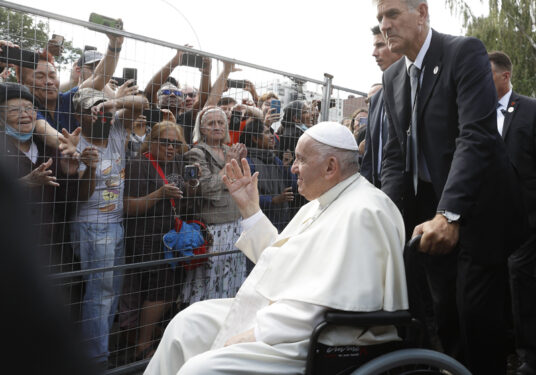By Inés San Martín
ROME (Crux) — Pope Francis’s whirlwind tour through Canada came to an end Saturday, and during the press conference aboard the papal plane he acknowledged that a genocide had been perpetrated against the Indigenous communities there.
In Canada, Pope Francis fulfilled his promise and apologized to the First Nations, the Metis, and Inuit for what was done to their communities — particularly, to 150,000 children — in the government-funded residential schools.
Canada’s government forcibly sent children into 139 residential schools run by different churches, including the Catholic Church, where they were cut off from their families, language and culture. The last school run by Catholics closed in the 1970s.
Many children were physically and sexually abused by headmasters and teachers.
Pope Francis started his trip with an apology: “I am deeply sorry,” he said on the grounds of a former residential school in Maskwacis, near Edmonton, defining the apology as a first step, but adding that a “serious investigation” into abuses must occur to foster healing.
He expressed “sorrow, indignation, and shame” for the actions of many members of the Catholic Church.

Pope Francis called the residential schools a “disastrous error” and asked for forgiveness “for the evil committed by so many Christians” against Indigenous peoples.
On Monday he apologized for the “catastrophic” ways families were torn apart; the following day he transitioned to praying to help them heal from the “wounds of violence.”
As is often the case when Pope Francis travels abroad, there were elements of his visit welcomed with cheer, while others were criticized.
But in what was arguably a first, the pontiff and his team were proactive in dealing with criticism as it came, rather than waiting to react much later. Perhaps with this strategy he was hoping to leave Canada having touched as many hearts as possible, and to signal more clearly that he wasn’t simply fulfilling a formality, but answering a sincere call for healing and reconciliation.
When a delegation of residential school survivors and Indigenous leaders visited the Vatican earlier this year, their witness visibly moved Pope Francis, who met with a delegation asking for compensation for the harm done to them: Infants were kidnapped from their families, had their identities erased, their language banned, and family ties and affection severed.
For Pope Francis, this was not a perfunctory trip. His willingness to address on Tuesday the criticisms of Monday — then on Wednesday taking the further step he was questioned about for not having taken the previous day — made that evident.
Despite having arrived in Canada with most of his remarks already prepared — as has been the case since the tradition of popes traveling abroad began — special attention was paid to what the criticisms were on the ground, and Pope Francis never withdrew from the pain of the people he met.
One of the reasons Pope Francis went to Canada was because the Indigenous deemed his apology from the Vatican insufficient.
On day one, he apologized in a personal manner. The following day, he noted that the school system was “promoted by the governmental authorities at the time” as part of a policy of assimilation and enfranchisement.”
But responding to criticism, he added that “local Catholic institutions had a part” in implementing that policy.
On Wednesday, having listed the sins and crimes committed in the schools, he was criticized for keeping sexual abuse out of the apology.
He incorporated this in his remarks on Thursday. In Quebec, Pope Francis said the church in Canada is on a new path after being devastated by “the evil perpetrated by some of its sons and daughters.”
“I think in particular of the sexual abuse of minors and vulnerable people, crimes that require firm action and an irreversible commitment,” he said in an address delivered in his native Spanish.
Though much is yet to be done when it comes to healing and reconciliation between Canada’s Indigenous population and the Catholic Church, Pope Francis’s trip shows an evident willingness to listen, consider the criticism, and if deemed necessary, address it.
For those waiting for him to rescind the XIV century “Doctrine of Discovery,” which allowed Europeans to seize properties in the “discovered” lands of the Americas — despite it having been abrogated the following century, when the Indigenous were acknowledged as equal to the Spaniards and the Europeans — there is reason to believe it might happen.
The trip was, after all, about apologizing for what happened in the past, so that there can be a reconciled future.

